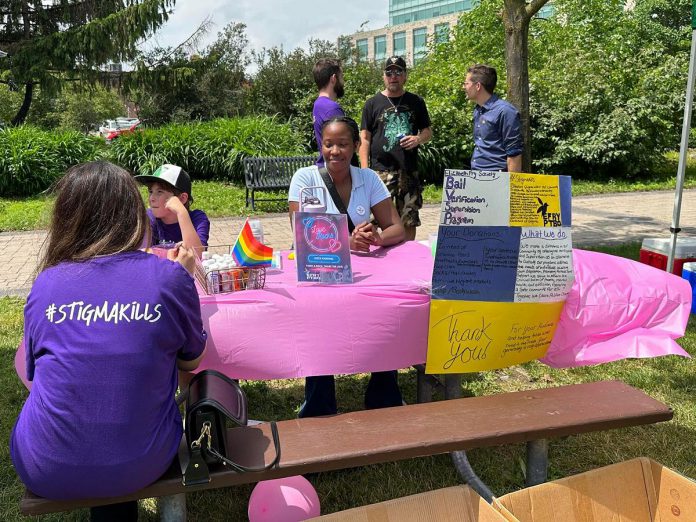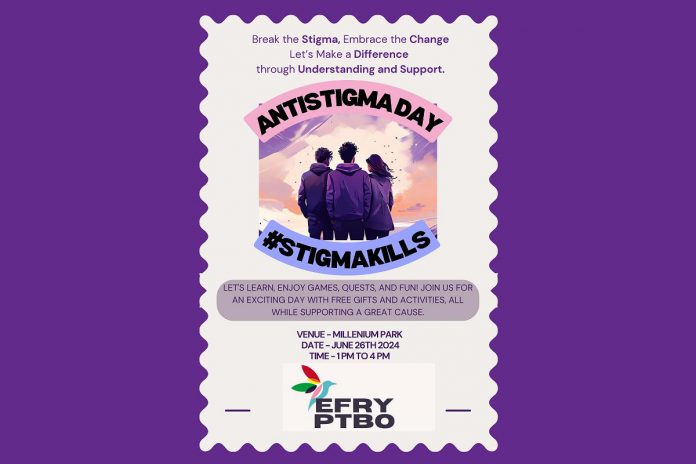
The Haliburton, Kawartha Lakes, Northumberland (HKLN) Drug Strategy is recognizing June 26 as “Anti-Stigma Day,” in the hopes of decreasing the amount of stigma experienced by people who use substances.
The HKLN Drug Strategy is ultimately aiming to instead increase the amount of compassion and understanding extended towards people who use drugs.
In recognition of Anti-Stigma Day, the Elizabeth Fry Society of Peterborough is hosting a community event with several other organizations on Wednesday (June 26) from 1 to 4 p.m. at Millennium Park, outside the Silver Bean Cafe, in Peterborough.
The goal of the event is to educate community members about the impact of negatives attitudes, beliefs, or behaviours about or towards a group of people because of their circumstances.
“We encourage everyone to be kind, and consider the language you may be using or encountering which can be extremely stigmatizing against those who use substances,” said Dane Record, chair of the HKLN Drug Strategy, in a media release about the event.
“Reducing the stigma associated with substance use is a huge goal for us and we commend the leadership and team at The Elizabeth Fry Society of Peterborough for their active involvement each year.”

In addition to raising awareness, organizers aim to equip community members with tools to combat stigma.
“Addiction is not a choice,” the release noted. “It is a treatable medical condition, yet many people affected by addiction face stigma.”
Stigma includes discrimination, prejudice, judgment and stereotypes, which can isolate people who use drugs, the release noted.
“People struggling with addiction face discrimination and barriers to getting help.”
The HKLN Drug Strategy said the impact of stigma can result in the following scenarios:
- Lead a person to avoid getting help because they are afraid of judgment or getting in trouble with work, their loved ones or the law
- Cause a person to hide their drug use or use drugs alone
- Affect a person’s ability to find housing and jobs, which affects their health and quality of life
- Contribute to people who use drugs receiving a lower quality of care from the health care system when they access services.
The community event at Millennium Park features educational activities, listening and information sessions, giveaways, and games.
The HKLN Drug Strategy said community members can help by changing how they speak about drug use. Language choice has a direct and deep impact on people who use drugs. “Using kind words can make it easier for someone to speak up, to feel understood or to receive help.”
The group suggests the following strategies:
- Use “person-first language,” for example, say “person who uses drugs” instead of “drug user”
- Use neutral, medically accurate words when describing drug use
- Avoid slang such as “addict” and “junkie”
- Use language that shows care and concern, rather than judgment
- Speak up when you hear someone being treated or spoken to in a disrespectful way
- Use language that acknowledges and promotes the fact that recovery from addiction is possible and looks different for everyone.
The HKLN Drug Strategy suggests these additional ways to help reduce stigma: do not define any person by their drug use; be respectful, compassionate and caring towards those who use drugs; and educate friends and family by passing on facts and challenging stereotypes.
The Elizabeth Fry Society of Peterborough began hosting its annual Anti-Stigma Day community event in 2021, selecting June 26 because the day has been earmarked by the United Nations Office on Drugs and Crime (UNODC) as “International Day Against Drug Abuse and Illicit Trafficking” to support the so-called “war on drugs” through social media campaigns, information, and more.
According to the society, UNODC’s and similar campaigns “serve to further stigmatize and ostracize our peers who use substances, and the information put forward by campaigns like these can be harmful in many ways, which we unfortunately often see locally, at an alarmingly increasing rate.”
Canada continues to experience an opioid crisis, which has seen increases in hospitalizations and deaths due to heroin, fentanyl, and other opioids, according to Statista, a global data and business intelligence platform.
As of 2020, around 25 per cent of Canadians stated they felt opioid addiction, overdose, and death in Canada was a crisis, while 44 per cent believed it to be a serious problem. Almost 18 per cent of Canadians report that they have used an illegal drug at some point in their lifetime, according to Statista’s findings. For more information, visit www.statista.com/topics/4533/drug-use-in-canada/.


























